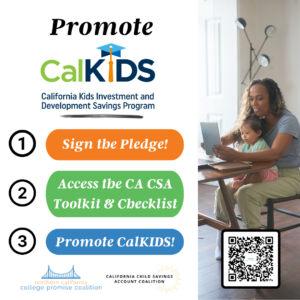Dec 20
Financing College

December 20, 2021 | By Edwin Burgos Perez
Applying to college can look different for many students, whether you’re deciding to attend a community college, a California State University (CSU), University of California (UC) or a private institution. Let’s break down how the financial aid process works as a part of the college application process.
The Free Application for Federal Student Aid, better known as FAFSA, is a free online form completed before applying to college and during each year you attend college. Most students wait to complete the FAFSA until the deadline, but there’s no need to wait. The FAFSA opens every October 1, and the priority deadline is in spring the following year for California students to also qualify for the Cal Grant. You can get tips on how to submit the FAFSA here. Students who do not qualify for the FAFSA may qualify to apply for financial aid with the California Dream Act Application (CADAA).
Eligibility
If you are eligible for the FAFSA, completing this application is critical in order to receive federal, state, institutional, and other financing to pay for each year you will be in college. Complete the application every year you decide to go to school to get as much financial aid as possible to cover your college expenses. Whether you attend a two-year community college to complete a certification or associate’s degree, or a four-year college to complete a bachelor’s degree, financial aid can help you cover your expenses.
The CADAA is another form of financial assistance for students interested in enrolling into California colleges, universities, and other educational programs, but who are not eligible for the FAFSA. Laws supporting the undocumented community include AB 540 and SB 68. Through AB 540, eligible students are exempt from paying non-resident tuition to attend their college of choice. Learn more about applying for the CA Dream Act here.
FAFSA vs CA Dream Act: Eligibility
-
Eligibility for FAFSA: You are a U.S. citizen, permanent resident, eligible non-citizen, or a T Visa Holder.
-
Eligible for CA Dream Act: You are undocumented, have valid or expired DACA status are a, U Visa Holder, have Temporary Protected Status, or meet non-resident exemptions requirements under AB 540.
To find out which application you are eligible for, click here.
Financial Aid Awards
Your financial aid packet will most likely consist of grants, scholarships, work-study, and loans.
In most cases, grants are free money the institution chooses to give you based on your Expected Family Contribution (EFC) and the other financial information you provided in the FAFSA or the CA Dream Act, as well as the CSS Profile if you were required to complete it. Loans or grants are aimed to help cover the fees and tuition cost of the school you attend. Here is a link that breaks down the different types of financial aid available.
Be very aware of key words like “grants” and “scholarships,” which are signifiers of money you will not need to pay back during or after college. You want to accept this financial aid, every time!

Financial aid like “loans” or “work-study” are not free to students.
Another way of financing your college expenses is through the assistance of loans. Loans will need to be paid in full. Plus, you will pay more than the original balance because loans have their own interest rates. Some loans have higher interest rates than others, and some loans have better repayment plans than others. Taking out loans might not always be the best financial option as loans can easily pile up through interest rates, multiple loans, and outside expenses. Learn more about loans here.
Work-study gives you the opportunity to earn money to pay for your expenses, but this also means the funds are not available for you to use right away. It is very important that you become familiar with the different forms of financial aid available for students to manage the cost of college. Learn more about work-study here.
Financial Aid Awards
FAFSA recipients may get granted:
- Cal Grant
- Chafee Grant
- Middle Class Scholarship
- UC Grants
- State University Grants
- California Community College (CCC) BOG Fee Waiver
- EOP/EOPS
- University scholarships
- Private scholarships administered by campuses
CA Dream Act recipients may be granted:
-
CCC Transfer Entitlement Cal Grant A & B
-
High School Entitlement Cal Grant A & B
-
Cal Grant C
Refer here to learn more about the different Cal Grants.
Have feedback, question, or a suggestion about this content page or Let’s Go To College Bay Area? Submit your feedback here.


